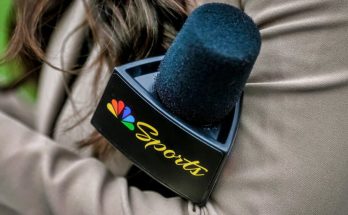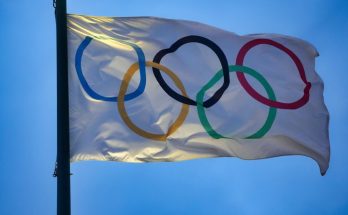Nobody I know has taken more joy from sport, or provided it with more fun in return, than my lunch guest, the once-in-a-century athlete Daley Thompson.
Arguably the greatest Olympian this country has ever produced, he walks down the quiet Sunday streets of Paris with his son Alex for a burger and Diet Coke. There is never a beer or a glass of wine on the menu when teetotal Daley is around the table — well, not at his place setting anyway.
The double decathlon gold medallist, 40 and 44 years ago in Moscow and Los Angeles, has been working for talkSPORT this fortnight, offering his forthright views over the airwaves by morning and late evening. Now, it is our turn to run by him the Games of the XXXIII Olympiad on its final day.
He goes everywhere in a tracksuit, including the wedding of his close pal and fellow triumphant figure of the 1980s, Sebastian, now Lord, Coe — the man he nominates in this interview to be the next president of the International Olympic Committee.
On Sunday, in the sweltering French heat, Daley was attired in summer casual of shorts and a T-shirt. His mood is chipper. He has loved what he has witnessed. One anecdote to start.


‘Alex told me I shouldn’t say this, but I met Noah Lyles in the lift yesterday and he looked just fine,’ recounts Thompson. ‘No mask.’
Lyles, the American braggart as well as a phenomenal sprinter, the 100 metres champion no less, cited Covid after he lost the 200m final to Letsile Tebogo of Botswana. Lyles took bronze.
‘He’s good for the sport, but he could have been a little more generous in defeat.’
So you think the Covid card was an act? ‘I don’t know about that, but he looked well, though I haven’t seen him before so I can’t be certain.’
Thompson, now 66 but still training to keep himself at 93kg, just over his competition weight of 90kg, ranks Paris among the best Olympics he has seen, just behind London 2012.
‘Everyone has been very friendly,’ he says. ‘All the grumps have left the city and we are left with the French people who couldn’t be kinder. This is the France I love.
‘Everyone has been helpful, pointing you in the right direction. They have used the landmarks of Paris at least as well as London. We have learned certain things from them and that will be useful when we next host the Olympics…’
I say yes, I agree, but what about the River Seine, scene of the triathlon and swimming marathons?



‘Could we use the Thames? I don’t know,’ he counters. ‘But I see the Lady Mayor of Paris swam it in a wetsuit to show how clean it is. But has anyone seen her since?
‘It has been brilliant. The opening ceremony was a little bit sophisticated for me, but the French loved it. It’s their money. The rest of it has been great.’
The drawback, if it is one, of being on the ground is traipsing from one venue to the next.
‘Best on TV,’ says Thompson. I show him how you can watch the BBC iPlayer on your phone if you switch off wifi and use data roaming. ‘Jon, I am very let down by you,’ he says. ‘You have told me that only now. I have been watching it on French TV and I don’t speak a word of the language. Well, I do. I can say ‘Paris’.’
The easiest rise to get out of Daley is to tell him that Sir Steve Redgrave is our greatest Olympian. I look at Alex, who smiles. Daley half smiles. ‘There’s a reason you say that,’ he ventures and I know there’s a jocular rejoinder incoming. ‘It’s because you know nothing about sport!’
Actually, Thompson and Redgrave spent time on a boat pre-Games, a corporate gig, and they got on well, old sores healed to a significant extent.
‘There were a few Q&As we did and my answers are brief but Steve filled in the gaps. I was grateful for that. We have worked on the radio together. We’re team- mates now. Who’s the greatest in any sport is subjective and I’m not bothered. All you can say is that whatever the sport is, the best of any era would have been brilliant in any other era.’
Thompson has sucked the atmosphere in like oxygen. He has revelled in Leon Marchand, the French swimmer who has bedazzled these Games, and has enjoyed hearing the French national anthem, including during a lull at the Stade de France in spontaneous singing.

‘I am as patriotic as it comes,’ says Thompson. ‘But if a French coach had come up to me there and then and asked me to compete for France, I might have signed up. It gave me goosebumps and it still does.’
He watched Novak Djokovic beat Carlos Alcaraz to gold at Roland Garros, a magical event, with the highest standard of tennis imaginable.
‘They were hitting the s*** out of it but when it was done Novak, a winner of 24 Grand Slams, was on his knees crying his eyes out. He is the best of all time, but it showed what it meant to him, the Olympic title.’
Britain have won ‘only’ 14 golds this time. There were 22 in Tokyo, 27 in Rio and 29 in London. Has it been down to bad preparation or bad luck, I wonder.
‘Not necessarily bad luck, just down to luck. We have been so close on many occasions — Josh Kerr in the 1500m, Matthew Hudson-Smith in the 400m and others in the velodrome — silvers that could easily have been golds. I don’t see that as a failure of the system, just the way it goes.
‘They will come back and win again, without doubt.’
Serious matters, now, touching on the sanctity of women’s sport, of which Thompson is an unapologetic defender. This has been brought into sharp focus at the Games by the involvement of boxers whose biological sex is uncertain.
Thomas Bach will stand down as IOC president next year. So, who should replace him, Daley? ‘I would say this because he is my mate, but I think Sebastian Coe would be great.
‘He has done an excellent job as head of World Athletics and I see no reason why he wouldn’t do as brilliantly for the Olympic movement.

‘There are changes they need to make. The IOC should be the body that other bodies look up to, rather than as it is now, where other federations make up their own rules. They could be stronger in their leadership.
‘Look at the boxing. There seems to be so much disinformation. People are being hurt and traumatised. If the IOC are going to be leaders, they need to lead.
‘In general, I don’t think they have looked after women well enough and protected their sport. Seb has done that in athletics. It has taken time, but they got there. If they fail in their duty of care to women, they have failed all round.’
Grave subjects aside, it comes to pudding. Alex and I pass. Daley, who ate up to 6,000 calories when he was training like mad four decades ago, plumps for fried banana, chocolate sauce and vanilla ice cream. He saves me a mouthful and passes me a fork.
‘I’ve loved Paris,’ concludes Daley, one man’s thirst for sport unquenchable.



